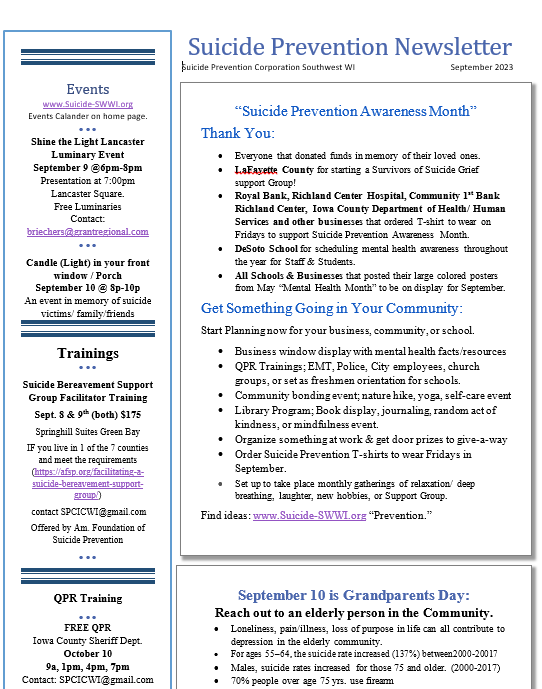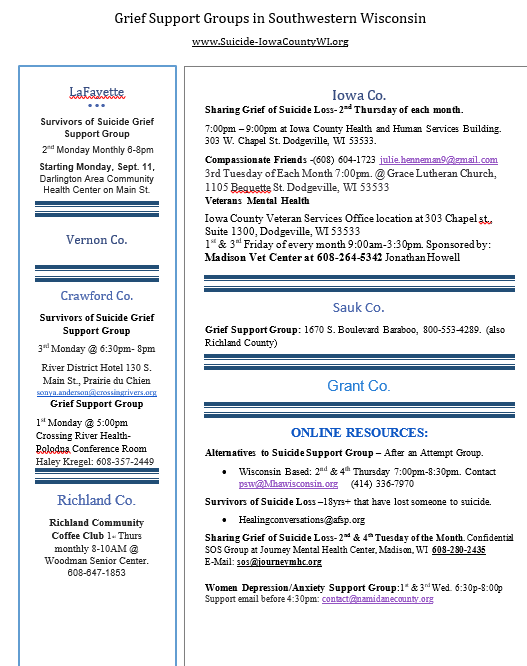
Alyssa Wade wrote a piece recently about farmers’ mental health during harvest. She makes a lot of excellent points that may be helpful to review as so many in our communities are dealing with these stressors right now.
“To those in the throes of harvest, it’s the accumulation of all their hard-earned efforts, and with that comes an intense and stressful season. Nearly all of the stressors that affect agricultural production are beyond the control of producers. Dealing daily with excessive workload, unforeseeable weather and extreme work conditions is exhausting.
Compound that with debt burden, unpredictable markets, inflation and equipment repairs, and it can result in endless hours of physical and emotional stress. Chronic stress can lead to injuries and accidents on the farm and, if left untreated, anxiety, depression and disease.
Stress in agriculture is inevitable, but learning how to identify it and manage it is crucial to staying healthy. Here are some changes you can incorporate this season to lessen stress and stay healthy while harvesting.
Eat healthy and drink water
During harvest, it can be easy to forget to take care of yourself. Stress eating can be tempting, and fast food is quick and convenient. Eating well-balanced meals with proteins, vegetables, fruits and complex carbohydrates during times of stress will keep you feeling full and energized longer. Stay hydrated by drinking plenty of water and try not to abuse caffeinated drinks to the point where you may begin to feel jittery or anxious.
Prioritize sleep
As the old adage goes, “there is no rest for the weary” and working till the job is done is something growers are all too familiar with. There are times there is no way around long days and late nights, but prioritizing sleep is crucial to staying healthy. Lack of sleep can decrease reaction times, cause poor decision making, and lead to mistakes and/or accidents that could cost you time and money. After a stressful day in the field, the best way to assure a restful slumber is to try to create a cool, dark space to lay down and unwind. Aiming for seven to eight hours of quality sleep is best, and rest whenever possible.
Get physical activity
Sitting for hours, days and weeks in machinery during harvest can lead to physical tension as well as elevated stress. Take time to walk after supper or in the morning before the day starts. A short walk can have big benefits such as improving cardiovascular health, weight loss, increased endurance and energy, and the release of endorphins to improve your mood and relax. Daily stretching releases tension both physically and mentally, increases range of motion preventing injuries, and increases serotonin levels.
Limit alcohol and drug use
As much as a beer (or several) after a long day may feel relaxing and helpful to wind down, it can also affect your ability to get a good night’s rest. It may help you fall asleep faster, but it inhibits you from reaching the REM sleep state and as a result, can leave you feeling less rested and more fatigued. Self-medicating with drugs and alcohol when stressed can lead to more serious mental health issues in the future like anxiety and depression.
Create a plan
Agriculture is unpredictable, and although unanticipated circumstances may arise, it will help you to sit down with your family and employees and develop a well-thought-out plan. In order to facilitate a smooth and efficient harvest, allow your team to give input and develop a plan of action. Assign responsibilities to everyone involved and allow others to share the workload. Have an emergency or crisis plan in place for unforeseen events. Make plans for how things would be handled in the event of machinery breakdowns, injuries, accidents or other disasters.
Build a team you can rely on
Building a team to support you and your farm is extremely important and can cut down significantly on stress during times like harvest. Your team starts with your family and employees. Discuss with them what skillsets they have that they feel would be most valuable. Clearly communicate your expectations and put each team member in a place where you feel confident with them completing the assigned task(s) safely and efficiently. If there are tasks you feel your team is not equipped to handle, seek experts to help, such as Extension specialists who can help you enlist agronomists, financial advisors or other ag experts.
Take time away from the farm
Harvest season isn’t exactly the perfect time to take a vacation, but you can still take time away from the farm even if it’s just mentally. Blocking out a small window of time every day to eliminate any sort of farm-related talk or thoughts can release tension and aid in diminishing stress associated with the day. Pray, meditate, listen to music or a podcast, watch your favorite TV show, or talk to family/friends. Ten to 30 minutes is enough to leave you feeling re-energized and newly focused. Having something to look forward to like a vacation or special plans when harvest is completed can be helpful to staying positive as well.
Seek help if you need it
The most important asset on your farm is you. If you are starting to show signs of extreme stress, it is time to ask for help no matter what is happening on the farm. It may be time to seek help if you are experiencing extreme irritability, anxiety, depression, muscle tension and pain, rapid heartbeat, exhaustion, headaches, dizziness, high blood pressure, and digestive problems. It is okay to ask for help. Your farm cannot thrive if you are not well.
Utilizing these tips may not alleviate all the stress that can arise during harvest, but they can substantially reduce it, and that will benefit both your operation and your health.”
A link to Alyssa’s full article is below if you’d like to read more.
Crisis Hotline: 1-800-362-5717 24 hours a day
If you or someone you know may be considering suicide, contact the National Suicide Prevention Lifeline at 1-800-273-8255 (En Espanol: 1-888-628-9454; Deaf and Hard of Hearing: 1-800-799-4889) or the Crisis Text Line by texting HOME to 741741
- HOPELINE Text service
- text HOPELINE to 741741
- Veterans Crisis Line
- Call 988 (press 1) or Text 838255
- Suicide & Crisis Lifeline in Wisconsin
- Call or Text 988





